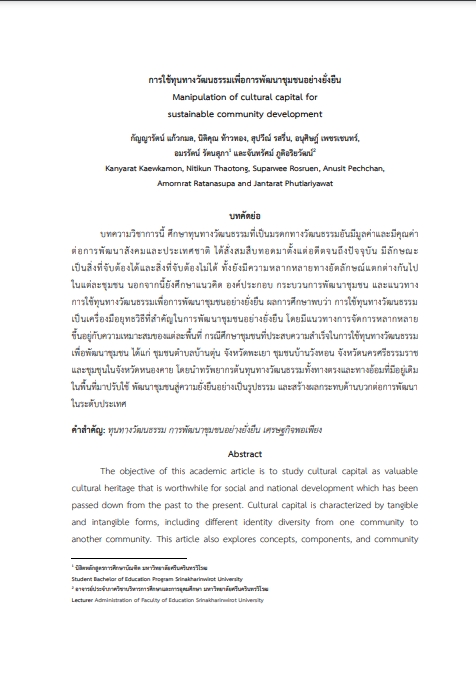Manipulation of cultural capital for sustainable community development
Keywords:
cultural capital, sustainable community development, sufficiency economyAbstract
The objective of this academic article is to study cultural capital as valuable cultural heritage that is worthwhile for social and national development which has been passed down from the past to the present. Cultural capital is characterized by tangible
and intangible forms, including different identity diversity from one community to another community. This article also explores concepts, components, and community development process as well as the guidelines for using cultural capital for sustainable
community development. The results of this study indicated that the use of cultural capital is an important tactical tool for sustainable community development. Various management approaches are established, depending on the suitability of each area. Successful community case studies have relied on using cultural capital forcommunity development, namely Ban Tun Community, Phayao Province, Ban Wang Hon Community, Nakhon Si Thammarat Province, and other communities in Nong Khai Province. They have applied both direct and indirect existing resources and cultural costs in the area to develop the community towards sustainability in a tangible way. This can create positive impacts for national development.
References
กมลทิพย์ พงษ์พิพัฒน์วัฒนา. (2560). ตัวชี้วัดความยั่งยืนสำหรับกิจการเพื่อสังคมในประเทศไทย: กรณีศึกษากิจการเพื่อสังคมด้านอาหาร. วิทยานิพนธ์วิทยาศาสตรมหา
บัณฑิต สาขาวิชาการบริหารเทคโนโลยี วิทยาลัยนวัตกรรม มหาวิทยาลัยธรรมศาสตร์.
ไกรฤกษ์ ปิ่นแก้ว. (2554, มกราคม-มีนาคม). เศรษฐกิจสร้างสรรค์ ทุนทางวัฒนธรรมและโอกาสทางธุรกิจวารสารนักบริหาร, 31 (1), 36. ค้นเมื่อ มีนาคม 13, 2564, จาก
https://www.bu.ac.th/knowledgecenter/executive_journal/jan_mar_11/
ขวัญเรือน บุญกอบแก้ว. (2562). แนวทางการปรับใช้ทุนทางวัฒนธรรมในการพัฒนาชุมชนบ้านวังหอน ตำบล วังอ่าง อำเภอชะอวด จังหวัดนครศรีธรรมราช. วารสาร
มนุษยศาสตร์และสังคมศาสตร์, 10 (ฉบับพิเศษ), 188-209. ค้นเมื่อ มีนาคม 17, 2564, จาก https://so02.tci-thaijo.org/
index.php/human_ubu/article/view/233079
จักรแก้ว นามเมือง. (2551). ทุนทางวัฒนธรรมในวัฒนธรรมไทย. กรุงเทพฯ: ห้างหุ้นส่วนจำกัดนวสาส์นการพิมพ์.
ชวดี โกศล. (2561). การบริหารจัดการทุนทางวัฒนธรรมของกลุ่มชาติพันธุ์ ในเขตพื้นที่ภาคเหนือของประเทศไทย. ดุษฎีนิพนธ์ปรัชญาดุษฎีบัณฑิต สาขาวิชา
รัฐประศาสนศาสตร์ บัณฑิตวิทยาลัย มหาวิทยาลัยรังสิต.
ไชยฤทธิ์ อนุชิตวรวงศ์. (2561). การศึกษาแนวทางการปรับปรุงการดำเนินนโยบายการพัฒนาที่ยั่งยืน และเป็นมิตรกับสิ่งแวดล้อมของประเทศไทยเพื่อตอบสนอง
ยุทธศาสตร์ชาติ 20 ปี. ปริญญานิพนธ์. วิทยาลัยป้องกันราชอาณาจักร. ค้นเมื่อ มีนาคม 19, 2564, จาก
http://www.dsdw2016.dsdw.go.th/doc_pr/ndc_2560-2561/8387e.html
ณัฏฐวุฒิ ทรัพย์อุปถัมภ์. (2558). ทฤษฎีและหลักการพัฒนาชุมชน Theory and Principle of Community Development. ค้นเมื่อ มีนาคม 19, 2564, จาก
http://www.academy.rbru.ac.th/uploadfiles/books/58-2018-08-01-08-41-20.pdf
ดิเรก ปัทมสิริวัฒน์. (2547). ทุนสังคม และทุนทางวัฒนธรรมในระบบเศรษฐกิจและการจัดการยุคใหม่.พิษณุโลก: คณะวิทยาการจัดการและสารสนเทศศาสตร์
มหาวิทยาลัยนเรศวร.
ธนัทณัฏฐ์ ฉัตรภัครัตน์. (2551). การศึกษากับการพัฒนาที่ยั่งยืน แนวทางและวิธีการที่จะก่อให้เกิดการพัฒนาที่ยั่งยืน. กรุงเทพฯ: ไทยพัฒนา.
บานชื่น นักการเรียน. (2559). การพัฒนาที่ยั่งยืน Sustainable Development. วารสารสิรินธรปริทัศน์, 17 (2), 64-69. ค้นเมื่อ มีนาคม 13, 2564, จาก
https://so06.tci-thaijo.org/index.php/jsrc/article/view/211501/146524
เปรมชัย จันทร์จำปา. (2558). การจัดการทุนทางวัฒนธรรมเพื่อการพัฒนาเมืองในเขตเทศบาลนครสงขลา. วิทยานิพนธ์นิพนธ์รัฐศาสตรมหาบัณฑิต สาขาวิชา
บริหารรัฐกิจ คณะรัฐศาสตร์มหาวิทยาลัยธรรมศาสตร์.

Downloads
Published
How to Cite
Issue
Section
License
Journal of Humanities and Social Sciences Nakhon Pathom Rajabhat University





